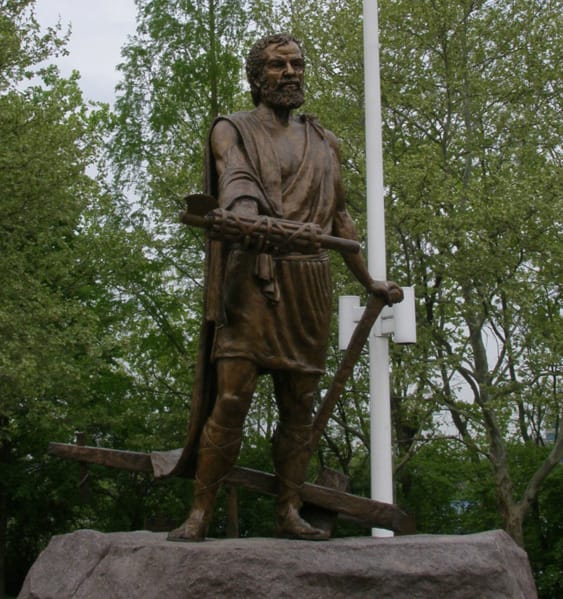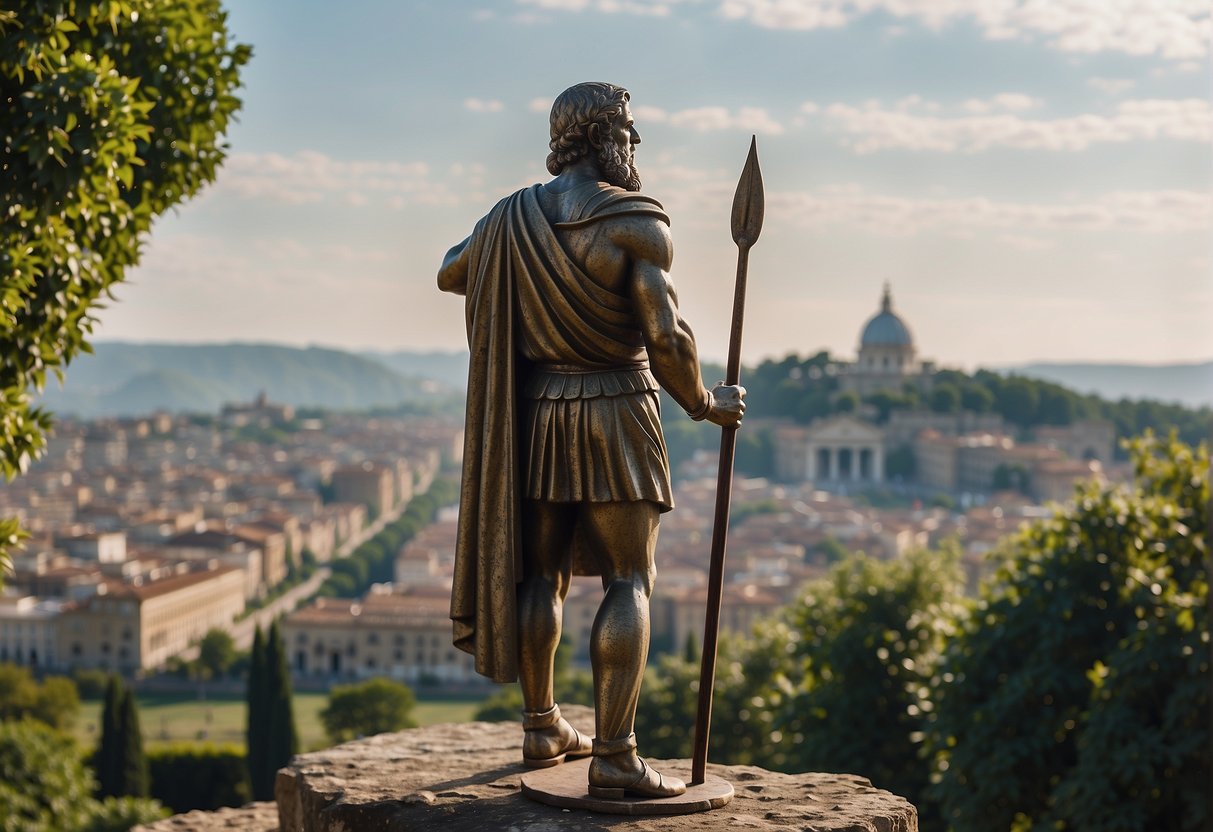Lucius Quinctius Cincinnatus, a figure cemented in history and admired through the centuries, stands as a paragon of civic virtue and the ideal of the citizen-soldier. His tale, rooted in the early days of the Roman Republic, embodies the resolve of an individual called upon to save his state from crisis. Chosen as dictator during a dire military emergency, Cincinnatus is famously known for his swift victory and his subsequent immediate resignation from absolute power to return to his humble life as a farmer.

The legacy of Cincinnatus extends far beyond his lifetime, influencing literature, culture, and even the founding principles of societies and governments that followed. His exemplary display of service, leadership, and modesty offered a template for public service that contrasted with the all-too-common narrative of power corrupting those who wield it. This striking commitment to the greater good over self-interest has inspired countless tales and discussions, situating him as an enduring symbol of moral integrity and republican ideals.
Key Takeaways
- Cincinnatus exemplifies the values of sacrifice and selfless service in the face of national need.
- His voluntary return to private life after serving as dictator is celebrated as the epitome of virtuous leadership.
- Cincinnatus’s influence persists in modern cultural and political discourse, serving as a benchmark for civic virtue.
Historical Context
In the narrative of Cincinnatus, the historical context is essential to understanding the values and the political landscape of Early Rome, focusing on the role of patricians and the structure of the Roman Republic’s governance.
Early Rome and the Patricians
Early Rome was dominated by patricians, a group of elite, noble families who wielded significant power in society. Throughout the region, flanking the Tiber River, these families maintained a stronghold on both the political and religious institutions dating back to around 400 BCE. The patricians were pivotal in shaping the early governance structures of Rome, establishing foundations that would influence the republic and its legacy.
The Roman Republic and Its Governance
The Roman Republic was characterized by a complex form of governance, with powers vested in various offices and assemblies. It comprised two consuls, the Roman Senate, and the comitia, reflecting a nuanced system of checks and balances.
The Senate, primarily composed of patricians, played a crucial role in policy and advisory functions, while the consuls wielded executive power. This period saw the cultivation of Roman values such as duty and service to the state, exemplified by the legend of Cincinnatus, a member of a patrician family who epitomized civic virtue.
Lucius Quinctius Cincinnatus
Lucius Quinctius Cincinnatus is a celebrated figure in Roman history, revered for his leadership and dedication to the Republic. His legend epitomizes the virtues of Roman citizenship, embodying humility and discipline in times of both peace and crisis.
Cincinnatus’s Early Life and Career
He was born into a patrician family known for their long-standing service to the Republic.
He pursued a life of farming, managing his lands at the Quinctian Meadows. Despite his noble birth, Cincinnatus valued simplicity, a trait that would later become a cornerstone of his celebrated legacy.
He entered public life early, first as a suffect consul and then as an esteemed member of the Senate, balancing his duties as a statesman with his agrarian pursuits.
The First Dictatorship
In 458 BC, facing a dire military threat, the Roman Senate found itself compelled to appoint a dictator who could unify and lead the Roman army. Cincinnatus, with his exemplary record of public service and respected leadership, was a natural choice.

He accepted the absolute authority with reluctance, temporarily setting aside his senatorial toga for the military garb of Rome’s supreme commander. Remarkably, after leading the army to a swift and decisive triumph, he resigned from his dictatorship a mere 15 days after it began, returning to his life as a farmer.
Return to Power: The Second Dictatorship
Several years later, Rome again called upon Cincinnatus to serve as dictator during a period of political strife between the patricians and plebeians. His second term proved his unwavering commitment to the Republic’s welfare over personal power. After achieving the necessary reconciliation and stabilization of the state, he once more laid down his absolute power and returned to his fields.
Cincinnatus’s Military Exploits

He is famously remembered for his swift and decisive leadership during critical moments in Rome’s early history. Entrusted with absolute power, he exemplified the virtues of a Roman citizen-servant and military leader, achieving victory with minimal conflict.
Battle Against the Aequi
The Aequi, a neighboring tribe of ancient Rome, posed a significant threat during the fifth century BCE. In a time of dire need, he was appointed as dictator, a role granting him complete control over the Roman army for a period critical to the survival of the state.
He accepted this second dictatorship in 458 BCE to defend Rome against the Aequi, who had besieged the Roman army in the Alban Hills. He organized a relief effort, resulting in a pincer maneuver that trapped the Aequi between two Roman forces. This tactic demonstrated his strategic prowess and commitment to quick and effective military action.
Victory at the Battle of Mount Algidus
At the Battle of Mount Algidus, his leadership and strategy led to a resounding victory against the Aequi. His forces attacked the Aequi from a higher position at Mount Algidus—an effective use of terrain that played a significant role in the combat’s outcome.
This battle showcased his capabilities not only as a skilled military leader but also his dedication to Rome, as he relinquished his absolute power shortly after the victory and returned to his life as a farmer. This event solidified his status as an exemplar of Roman virtue and as a model for future generations.
The Virtues of Cincinnatus
The character of Cincinnatus is celebrated for embodying Roman virtues, particularly through his leadership, civic responsibility, and willingness to relinquish power for the sake of the republic. This integrity made him a symbol of ideal governance, later inspiring figures such as George Washington during the American Revolution.
Leadership and Authority
He assumed command of the Roman Republic in a time of crisis, swiftly leading Rome to victory. He demonstrated decisive leadership and wielded authority effectively, which showcased his capabilities as a military strategist and a statesman. His governance was marked by respect for the rule of law and devotion to the state’s interests over personal gain.
Civic Virtue and Humility
The heart of Cincinnatus’s legend lies in his civic virtue and humility. He was a paradigm of Roman virtue, putting the welfare of the republic above his own. After resolving Rome’s military emergency, he returned to his farm, declining rewards and the continuation of power. This act was a testament to his strong ethical principles and modesty.
Retirement and Legacy
Cincinnatus’s self-imposed retirement after serving as dictator became a cornerstone of his legacy. It has been immortalized in history and myth, representing the ultimate sacrifice and duty to one’s country.

His legend helped to define the concept of civic service in the newly founded United States, where George Washington, following the Revolutionary War, mirrored Cincinnatus by returning to civilian life instead of seeking political domination.
Cincinnatus in Literature and Culture
He is a pivotal figure whose legend has been a fixture in literature and cultural discussions, symbolizing the ideals of virtue and civic duty. His story has been recounted through various historical and fictional lenses, often used as an archetype for leadership and moral integrity.
Livy’s Historical Account
Titus Livius, known as Livy, provides one of the most influential accounts of Cincinnatus’s life in his work, “Ab Urbe Condita.” Livy portrays him as a paradigm of Roman virtue, emphasizing his role as a Roman consul and a historical figure who prioritized the common good over personal gain.

Notably, he is called upon to serve as a dictator to save Rome from invasion, only to resign and return to his farm once victory is secured, showcasing his humility and dedication to the Republic. Livy also delves into the conflict with Spurius Maelius, wherein Cincinnatus, exercising his dictatorial powers, secures Rome’s social order. This episode reflects the greater tensions within the Roman Empire, as characters like Julius Caesar and Augustus later veered away from his example, choosing to retain power rather than relinquish it.
Comparisons to Modern Leaders
The legend of Cincinnatus has often been employed in drawing parallels with modern statesmen, particularly those who embody the “citizen-servant” ethos. George Washington, during the American Revolution, is frequently likened to Cincinnatus due to his relinquishment of power after the war and his eventual return to private life. This comparison reflects how his narrative has transcended time, influencing the foundational principles of new republics and leaders.
Digesting the cultural significance of this myth through the lens of Cicero and other classical figures allows for an appreciation of the enduring values that Cincinnatus represents. The recurring theme of power as a temporary stewardship rather than a personal entitlement has resonated through centuries, from ancient Rome to the formation of democratic societies.
The Lasting Impact of Cincinnatus
Lucius Quinctius Cincinnatus’s legacy endures through his embodiment of leadership and honor. His story provides a template for public service and has imparted a lasting influence on various cultural and civic entities.
Cincinnatus’s Influence on Leadership
Cincinnatus is renowned for his exemplification of selfless leadership and dedication to civic duty. As a Roman statesman, he left his farm to accept a critical role in Rome’s leadership. His commitment to the state before personal gain has inspired the concept of servant leadership.

Cincinnatus’s tenure as a leader is frequently cited in discussions of moral authority and the virtues of sacrifice and reason in governance. His decision to relinquish power voluntarily demonstrated a rare form of leadership guided by logic and a profound sense of duty, setting a benchmark for leaders in various sectors.
Civic Organizations and Places Named After Cincinnatus
Cincinnatus’s name has been immortalized through the Society of the Cincinnati, an organization founded in 1783 by officers of the Continental Army and their French counterparts. It was created to honor and preserve the ideals of honor and public service that Cincinnatus represented.
Furthermore, the city of Cincinnati, Ohio, was named in his honor, reflecting the values associated with his legacy. Upstate New York is home to a town called Cincinnatus, keeping his name and story alive through geographical legacy. Even a tract of land in Marietta, Ohio, Campus Martius, was named in reference to Cincinnatus, aligning with the city’s narrative of sacrifice and contribution to the greater good.
Comparative Analysis

In comparing historical figures, the focus often rests on their leadership qualities and how they managed power. The legend of Cincinnatus offers a rich point of comparison with influential leaders such as George Washington and contrasting figures of Roman emperors.
Cincinnatus and George Washington
Cincinnatus was a Roman statesman who gained fame for his selfless act of returning to his farm after serving as a dictator during a crisis, embodying the virtue of relinquishing absolute power. George Washington, as the Commander-in-Chief of the Continental Army during the American Revolution, displayed a similar restraint.
After leading the United States to victory, like Cincinnatus, Washington returned to his farm at Mount Vernon, declining the opportunity to grasp absolute authority.
Washington’s leadership:
- Relinquishing command after the war;
- Resisting calls to become a monarch.
Comparative aspects with Cincinnatus:
- Voluntary return to civilian life;
- Favoring Republican ideals over personal gain.
Cincinnatus vs. Roman Emperors
In stark contrast to Cincinnatus, many Roman emperors, such as Julius Caesar and Augustus, consolidated their control and transformed the Roman Republic into the Roman Empire. Their approach favored establishing and maintaining absolute power.
Roman Emperors’ grasp on power:
- Caesar bypassed the Senate, amassing personal power (absolute authority);
- Augustus positioned himself as the Princeps, or first among equals, subtly accumulating imperial power.
Comparatively, Cato the Younger was another Roman figure who upheld the traditional Republican values against the rising tide of autocracy but ultimately failed. Cincinnatus’s narrative serves as a polar opposite to the ambitions that drove figures like Caesar and Augustus, emphasizing the virtue of power restraint over the desire for absolute power.
Frequently Asked Questions
The Legend of Cincinnatus is steeped in virtue and civic duty, capturing the essence of selfless leadership.
What is Cincinnatus famous for?
Cincinnatus is renowned for his exemplification of Roman values, particularly his display of virtus (courage and virtue) by serving as a dictator of Rome and then willingly relinquishing power to return to his farm.
What were the major accomplishments of Cincinnatus?
His major accomplishments include assuming absolute power during a dire military crisis and subsequently achieving victory for Rome, followed by his prompt resignation from the dictatorship.
How is Cincinnatus’s legacy reflected in modern times?
Cincinnatus’s legacy lives on as a symbol of civic virtue, often used as a paragon of selfless leadership in the context of public service.
In what ways did Cincinnatus contribute to ancient Roman society?
Cincinnatus contributed by serving as a model citizen, prioritizing the needs of the state above personal wealth and power, and thus reinforcing the Roman expectation of duty to the Republic.
How is the story of Cincinnatus significant in historical literature?
The story of Cincinnatus is significant in historical literature as it sets a benchmark for leaders and heroes across time, often cited as an example of ideal leadership and sacrifice.
Why is Cincinnatus often hailed as a hero in historical accounts?
Cincinnatus is often hailed as a hero because his actions demonstrated integrity and a deep commitment to the Roman Republic. These qualities have stood as a high standard for statesmanship throughout history.
